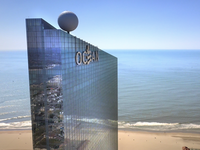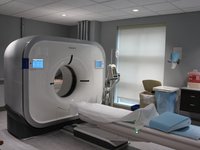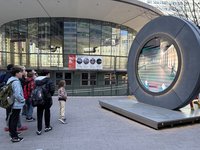The U.S. Food and Drug Administration has granted Eli Lilly's COVID-19 antibody treatment an emergency use authorization to treat mild and moderate infections in adults and older children.
Bamlanivimab, a monoclonal antibody therapy, is synthetically made to strengthen the immune system's response to the coronavirus. It is the first monoclonal antibody to be authorized as a COVID-19 treatment. Regeneron, a similar therapy, also has applied for an emergency use authorization.
- MORE HEALTH
- Pfizer's COVID-19 vaccine has higher effectiveness rate than expected
- Philly residents who took part in election demonstrations should self-isolate for two weeks, city health officials say
- Well City Challenge seeks innovative ideas to improve millennial health
Bamlanivimab has been found to reduce COVID-19 hospitalizations and emergency room visits among people with mild or moderate symptoms.
The single dose infusion only can be administered by a health care provider in a hospital or other health care setting. It only is to be used within 10 days of symptom onset. Children must be at least 12 years old and weigh at least 88 pounds to be eligible for treatment.
Bamlanivimab isn't authorized for COVID-19 patients already hospitalized or those requiring oxygen therapy. Data has shown that monoclonal antibodies offer no real benefit to patients battling severe COVID-19, and might even worsen the condition of such patients.
"While the safety and effectiveness of this investigational therapy continues to be evaluated, bamlanivimab was shown in clinical trials to reduce COVID-19-related hospitalization or emergency room visits in patients at high risk for disease progression within 28 days after treatment when compared to placebo," the FDA said in a statement.
The emergency use authorization, which is separate from FDA approval, is based on data from a Phase 2 trial of 465 non-hospitalized adults with mild to moderate coronavirus symptoms. They were randomized to receive either bamlanivimab or a placebo.
Overall, those who received one of the three different doses – 700 mg, 2800 mg or 7,000 mg – of the monoclonal antibody were less likely to need hospitalization or a trip to an emergency room.
Only 3% of the patients treated with bamlanivimab were hospitalized or spent time in the ER compared to 10% of the patients in the placebo group. An interim analysis of the study's findings were published in the New England Journal of Medicine in October.
Possible side effects include anaphylaxis and infusion-related reactions, nausea, diarrhea, dizziness, headache, itching and vomiting.
"The FDA's emergency authorization of bamlanivimab provides health care professionals on the front line of this pandemic with another potential tool in treating COVID-19 patients," said Dr. Patrizia Cavazzoni, acting director of the FDA's Center for Drug Evaluation and Research.
Lilly plans to manufacture a million doses by the end of the year. Treatment will be free to patients.
"Lilly will begin shipping bamlanivimab immediately to AmerisourceBergen, a national distributor, which will distribute it as directed by the U.S. government's allocation program," the company said in a statement.







